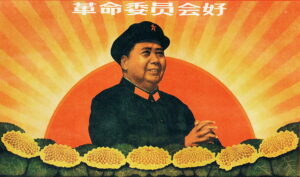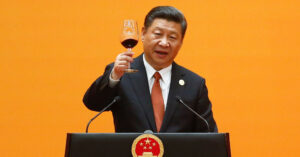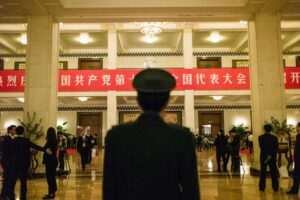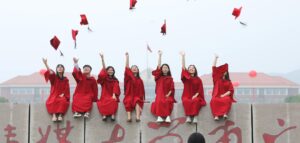Nearly four years after reports first emerged from Wuhan of a mystery virus filling hospitals with sick patients, we are told of an “unidentified pneumonia” circulating in China. Unlike last time, however, a healthy number of sceptics have been paying close attention. One side effect of Covid has been the puncturing of our illusions about the Chinese medical establishment’s ability to withstand Communist Party pressure. Our naivety on that front is unlikely repeat itself if another pandemic emerges.
There is less agreement about the onset of our second bout of David Cameron. His appointment as Foreign Secretary last month roughly coincided with Xi Jinping’s first visit to the United States since 2017. The two events conspired to convey a sense of things going “back to normal” on China. There were Biden and Xi smiling together. Here was Cameron, who during his time as prime minister instigated a “golden era” of relations with China, responsible for Britain’s foreign policy.
Have we learnt the lessons of that era? Or, pandemics aside, do we remain naive about the CCP? An exchange last month between Rishi Sunak and Keir Starmer at Prime Minister’s Questions offers some clues. Starmer began his attack with a jab at our new Foreign Secretary’s work with Beijing since leaving office in 2016, citing concerns expressed by the security services that Cameron’s jaunty and likely lucrative interim may have been “engineered” by the Chinese government, who clearly think they have a friend in Dave.
In response, Sunak delivered a string of official terminology: “The government’s position on China is clear: China represents an epoch-defining challenge, that’s why we have taken strong and robust steps to protect ourselves against the risk that it poses.” He went on to say he wouldn’t take lectures from Labour, who have “taken almost £700,000 from an alleged Chinese agent!” Their discussion of China ended there.
Sunak’s accusation aimed to strike a nerve. In January 2022, MI5 issued a warning to MPs about Christine Lee, a lawyer known for her connections across the political spectrum and for donations to Labour and the Lib Dems. Lee was also known in the British Chinese community for having campaigned to raise its election turnout rates, and for an initiative to identify and promote young British-Chinese politicians.
This was not, however, a classic case of “spies expose secret information in service of public”. MI5 were alleging that Lee’s donations were engineered by the CCP, which no publicly available data seems to suggest. Lee’s work and closeness with the CCP, however, were openly described — albeit in Mandarin — on Chinese government websites, where she was named as a “director” of a body overseen by the CCP’s United Front Work Department (UFWD), which operates mostly in China but has a side-hustle running influence and interference operations abroad. This had been the case since 2018 and had been highlighted by news articles and a book on CCP infiltration published in 2020.
Lee’s connections in China were even older. In fact — and this is a key point routinely overlooked — they were a crucial part of her influence in the UK in the first place. MI5’s announcement was the first time the UFWD was named as a specific threat in the UK, but during Cameron’s “golden era”, those with connections to the UFWD were hailed by the British government as “bridge builders” and “ice breakers” and given opportunities to make money and friends in high places. Lee’s own law firm was listed as a preferred partner by the Department for International Trade up until a week or so before MI5 outed her in January 2022.
At that time, the rumour among China watchers was that MI5’s notice — which came to light amid the scandal over lockdown parties in No. 10 — had been, as one person put it, “sitting on a desk in the Home Office for a long time”. It was supposedly released by Priti Patel, then Home Secretary, to divert media attention from the lockdown parties.
Few people know whether this is true. Certainly, however, the notice has not been truly substantiated, the promise of further such notices (and an inquiry) has not materialised, and Lee is suing the Government. Hence Sunak’s surreal use of the phrase “alleged Chinese agent”. It is, after all, the Government that “alleged” Lee was an agent. There remains no alternative account of why the warning was released when it was.
No similar notice has been issued about Xuelin Bates, a Conservative party donor who married Lord Michael Bates in 2012. During Bates’s nearly two-year stint at the Home Office, during which time he worked as under-secretary for Criminal Information, Xuelin worked as a consultant for the Chinese government while appearing at events to promote Chinese education and business alongside a convicted fraudster linked by court judgments to the proceeds of organised crime. Shortly after Bates stopped his work as a Minister of State in the Department for International Development in 2019, Xuelin was appointed to a role at the same UFWD-overseen body in China as Christine Lee.
This hardly sounds like a house well in order. Many within the British state are still surveying the damage, patching leaks, and wondering how deep the rot has set. Part of the problem is that China is not limited to conventional intelligence services such as the Ministry of State Security (MSS) and the People’s Liberation Army (PLA) intelligence wing, which are comparable — though much less constrained in their operation — to Western intelligence agencies. Rather, it operates in a far more unfamiliar, sweeping, penetrating manner with intelligence and surveillance running through the CCP at every level.
Take the UFWD, which is one of the six main CCP departments. One of its formal responsibilities is to gather intelligence on the activities of what it calls “Overseas Chinese”, which mostly includes recent or temporary Chinese-born migrants in places including the UK. For the purposes of so-called “Overseas Chinese Affairs” — a category important and well-known enough to be given a two-syllable acronym, qiaowu (侨务) — the UFWD can call upon a senior official in the Chinese embassy in London, Jiang Lei.
Part of Jiang’s job as “Overseas Chinese Affairs Counsellor” is to go to as many “Overseas Chinese” events as possible — from sports prize ceremonies and cultural evenings to business networking meet-ups and academic conferences. At these events, Jiang can network with and offer business opportunities to all manner of people. The British Chinese businessman at the centre of the “Chinese overseas police stations” furore openly discussed the UFWD’s assistance for “Overseas Chinese” entrepreneurs in an online interview with Chinese state media.
As well as micro-managing Chinese civil society outside of China, CCP surveillance also targets Westerners. UFWD cadres tend to zoom in on an influential British person or group who appear sympathetic to China — and then seduce them with promises of funding, prestige, paid work, and useful connections. This form of “soft espionage” targets business, research, public bodies, culture, industry, and politics, shaping narratives and gathering information.
The complexity of this holistic approach partly explains why British politicians disagree so much over how to define the threat China poses. The Government’s “Integrated Review of Security, Defence, Development and Foreign Policy”, published in 2021, called China “the biggest state-based threat to the UK’s economic security”, “an increasingly important partner in tackling global challenges like pandemic preparedness, biodiversity and climate change”, and more simply as a “systemic competitor”. A later version of the review called China an “epoch-defining and systemic challenge” — hence Sunak’s recital.
Many have since lined up to criticise this nauseating pick-and-mix approach, calling for China to be labelled a “threat”. But the symbolic discussion about rhetoric has also morphed into a concrete one about policy. The Government is currently drawing up plans for a formal registry of foreign influence agents. This could classify China as a “threat” in such a way that would affect the “grey-zone” activities of Lee and Bates and their ilk.
Whatever form the registry takes, it is unlikely to be a panacea. The Australian and American versions are deeply flawed. In Australia’s case, the public register introduced in 2018 was at one point spammed by former PM Kevin Rudd in an act of protest. In the US, there are unfeasibly few China-related entries, and the system functions more than anything as a way of prosecuting those who fail to register, as in the case of individuals associated with one of China’s “overseas police service stations”.
The UK government is currently consulting over exactly how the register should work, with unenthusiastic parties, such as China-facing consultancies, asked to share their concerns. Businesses have also been given the chance to state objections regarding separate powers, legislated for in 2021, that enable the Government to scrutinise investments by Chinese entities in sensitive industries. There thus remain doubts about the “strong and robust steps” Sunak referred to in the Commons — especially since there has long been a sense that big business, hooked on China’s huge market, continues to pull the Government back.
The response of the CCP-sceptic lobby to this dynamic has been to cast doing business with China as a “risk”, and to brand moving investments out of China — or “de-risking” — as a means of protecting future balance sheets. Key to this argument have been tensions over Taiwan. If China invades, so the story goes, and if the US sanctions China, then your company will pay for not “de-risking”.
The conversation about British “de-risking” ought to be fraught. Between 2012 and 2022, China was the UK’s seventh-fastest growing export market — a significant statistic given that the six countries ahead of China were all smaller geographically than England (North Macedonia, Panama, Luxembourg, Lithuania, Switzerland, Gibraltar). Most important, however, is the fact that the UK’s bloated financial sector is massively exposed to China, by some metrics more than any other Western country.
In October, UK banks held secretive meetings about this exposure and drew up an overview that they shared with Western governments. The UK’s largest bank, HSBC, is in a particularly tight spot following attempts by a Chinese shareholder — seen off for now — to split the bank in two, with its profitable Asian business going to a theoretical China-headquartered daughter firm. The coup attempt was dealt with partly by reference from executives to healthy profits. But given that nearly half of the bank’s profits are made in China, is there any way HSBC can perform an elegant “de-risking”? Probably not, which means that if the “Taiwan risk story” comes true, the UK will suffer an exceptional hit.
With Britain facing such towering risks and diplomatic sensitivities, good judgement is required. Lost amid the outpouring of disdain for Cameron’s lobbying for Beijing is the real scandal: our new Foreign Secretary’s “epoch-defining” record of poor judgement on China.
The key is 2013. That year, Xi sealed his position as China’s undisputed leader by releasing a communique, Document Number Nine, which stated that China was being infiltrated by “Western anti-China forces” posing a threat to the existence of the CCP, and that an aggressive counter-offensive was required. Free media, free speech, academic freedom, economic liberalism, independence movements are all bad, per Document Number Nine, and must be obliterated within China.
This was the year that Cameron chose to launch an unprecedented period of UK-China cooperation. As British civil servants, university administrators, and business executives began to devise ways to make sure Britain became China’s “best friend in the West”, CCP cadres and officials executed Xi’s aggressive counterattack.
All the while, the CCP worked hard to propagate the image of a friendly Xi, peaceful and productive. Pumping money into academic institutions and the media helped (The Telegraph, The Financial Times and The Economist have all been paid to publish CCP propaganda). This was Xi the eco-warrior, the anti-corruption crusader, the defender of globalisation. Above all, this Xi was nothing to be feared. As he told the United Nations in 2017: “For several millennia, peace has been in the blood of us Chinese and a part of our DNA.”
Document Number Nine was largely ignored in the West, but it set the tone for a transformation in Chinese society: the implementation of Xi Jinping’s personality cult, the securitisation of society, a military build-up, political purges, the neutralisation of Hong Kong, the intensification of ethnic cleansing in China’s colonies of Tibet and Xinjiang, a revolution in “Overseas Chinese affairs” work, territorial clashes with China’s Indian and Bhutanese neighbours, support for Russia’s invasion of Ukraine, and more assertive incursions against Taiwan and the coastal waters of the Philippines, Malaysia, Brunei and Vietnam.
Taken together, these policies make the character of Xi and his regime clear. The writing is on the wall. Yet, even now, we have only half woken up to it. Some still see Xi as peaceful, at worst merely a committed and effective “CEO China” who has amassed power “without bloodshed”, as one prominent British professor, Kerry Brown, wishes us to believe.
This is not to say that our politicians and diplomats should go out and insult China or commit to defending Taiwan or the Philippines. Nor is it to say that it is Britain’s job to challenge China on the world stage, or to follow the United States in whatever Pacific tangle it might find itself in. It is just that whatever else Britain’s China policy does, it must never again make Cameron’s mistake of taking the CCP at its word. It must guard first and foremost against the illusions that would incapacitate us.
The Romans said “Fas est et ab hoste doceri” — right it is to learn, even from the enemy. Whether or not the UK government chooses to designate the CCP as an “enemy”, we should aspire to learn from one of its favourite slogans “shishi qiushi” — seek truth from facts.
Disclaimer
Some of the posts we share are controversial and we do not necessarily agree with them in the whole extend. Sometimes we agree with the content or part of it but we do not agree with the narration or language. Nevertheless we find them somehow interesting, valuable and/or informative or we share them, because we strongly believe in freedom of speech, free press and journalism. We strongly encourage you to have a critical approach to all the content, do your own research and analysis to build your own opinion.
We would be glad to have your feedback.
Source: UnHerd Read the original article here: https://unherd.com/







